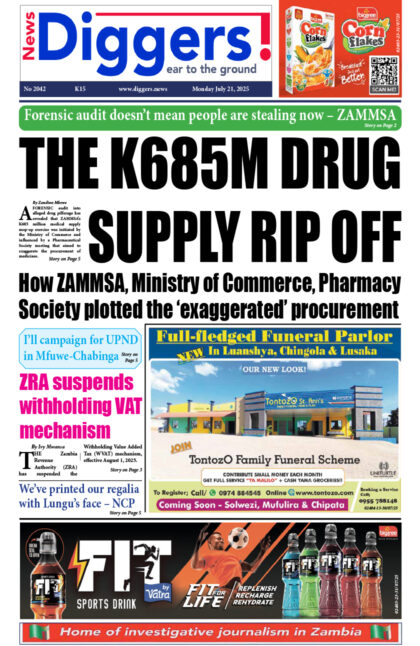Agriculture Minister Dora Siliya says farmers who stored their maize will sell their produce for a good deal in December and January when prices swell.
Speaking when she featured on ZNBC’s Sunday Interview, Siliya however, noted that millers would not be able to buy maize that was not kept properly.
“30 percent of the crop is lost because of the storage challenges. Sometimes the farmer might not like the price this time, but by December, the price will be higher. Why? Because this crop would have been dwindling from export, from consumption. We start waiting for the new crop. So the price of the current crop goes up by December to January. But if the farmer can’t store properly, no miller is going to buy it so sometimes a farmer can be able to wait for the future. But if he has no proper storage, that becomes a challenge. We are working with ZAMASE to try and work on the storage system, a warehouse system that should be able to support farmers even if they can’t afford it on their own,” Siliya said.
Asked if she was struggling to manage the agricultural sector, Siliya said the insinuation was surprising because the sector was just taking off.
“I would be surprised with that statement but again at the congress, somebody else captured the point at which Zambia’s agriculture is, and they said that it is not a sleeping giant anymore, it is awake, its eyes are darting all over the place. And what we are trying to do in government is we are trying to inject the giant that is awake now with the right energy so that it can really take off. And what are we doing? Clearly on the national level, we have spelt out the plan in the 7th National Development Plan. In the Ministry, we had the second agriculture policy introduced so that we are consistent,” she said.
“We also have a very clear agricultural investment plan which is part of the comprehensive Africa Developmental program. We are making sure that we just do not look at the farmer’s activity on the farm but what happens beyond the farm. We are looking on the issues of storage, we are looking at grain beyond rainfall, agriculture with irrigation program, we are looking at issues of mechanization. Once you have cultivated, you have irrigation, we want to improve productivity, we want to improve efficiency. We are looking at innovative ways to finance agriculture, we are looking at how women and the youth can play a bigger role in agriculture, we are looking at developing new agriculture towns and this is what the farm blocks are about.”
And Siliya said government would this year spend K1.7 billion on paying one million farmers as supplementary funds.
“Government will this year spend K1.7 billion paying it as cash to farmers. Each farmer will get about K1,700 on the card, they will contribute themselves K400. Now what this means is that government is saying, our goal will be targeted to those farmers on the list, we will give them the money, they will make an informed decision as private sector because, don’t forget farmers are private sector. They will make an informed decision, a business decision on their own,” Siliya said.
“I know that everybody kept talking about last year. Now let me repeat this, agriculture is not just about one year, no. agriculture is a long term process, it is a long term activities and we have to monitor it over a period of time, maybe at least five years to see how well we have done. Now this year, it will be 100 percent E-voucher. What that means is this, government is going to pay one million farmers who are on our database. We have got a consolidated database that was sitting in various places and consolidated it using Smart Zambia Institute and we cleaned up this database to ensure that their IDs, we can verify their registration cards and tie it to the face so that there are no more ghost farmers and abuse.”
Meanwhile, Siliya said government would only intervene in the market for the good of citizens.
“If production continues to increase like we have seen this year 3.6 million metric tonnes of maize, there is no need for government to intervene in the market. Government can only intervene in the market for the good of the citizens. Now in the process of intervening, one group might be hurt, in this case, it was the grain traders because they had the maize, government had no maize, millers had no maize, the citizens had no mealie-meal. So government is a responsible government, an elected government had to do the right thing knowing that some people will be hurt, but we had to do a bigger good for the public. It was a one-off decision and we continue to be consistent that we encourage exports especially of agriculture exports. It will be unthinkable for us not to encourage exports when we know clearly the link to the price for the farmer and his livelihood,” said Siliya.


















